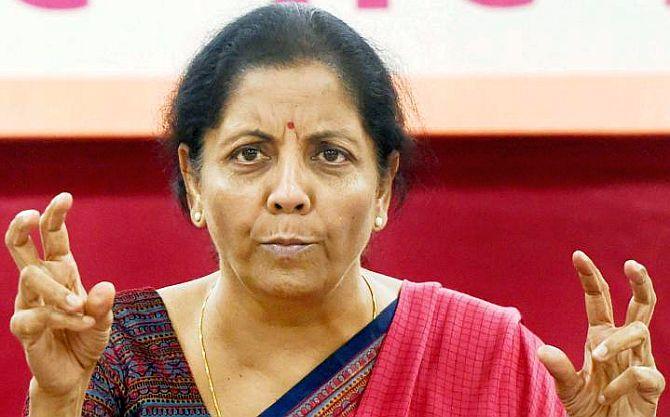'No recent Union Budget has held so much significance for the Indian economy as the one to be presented in about six weeks from now,' notes A K Bhattacharya.

The importance and even relevance of annual Budgets of the Union government have seen a gradual decline over the last many years.
There was a time when the Union Budget would be keenly awaited by industry to know which products or services have got a duty relief or attracted a fresh impost.
Company managements and individuals would keep their attention focused on the finance minister's speech to understand what direct tax benefits they would get or lose from next year.
But with the roll-out of the goods and services tax and the introduction of relatively stable rates of income tax for individuals and corporation tax for companies, the Union budgets have begun losing their earlier appeal or even glamour.
It's true that even now they do create some excitement over the many government schemes announced by the finance minister and they also get talked about, but the intensity is not the same and nor are the expectations so high.
Budget 2020, however, will be different.
In spite of the stable direct tax rates and the GST regime in place, the Union Budget to be presented by Finance Minister Nirmala Sitharaman on February 1 will be a keenly awaited document.
In fact, no other recent Union Budget has held so much significance for the Indian economy as the one to be presented in about six weeks from now.
The reasons for this are not a secret.
The Indian economy has been facing a steady deceleration in the growth rate of its gross domestic product for the last six consecutive quarters.
The few steps that have been taken are yet to make a positive impact on the pace of growth.
India's financial sector is not yet out of the woods.
Even before the twin balance sheet problems of the Indian economy could be tackled through recapitalisation of public-sector banks and resolution of stressed loans borrowed by several Indian companies, new problems have hit the non-banking finance companies.
The collapse of an urban cooperative bank added to the woes of the financial sector.
In spite of the Reserve Bank of India reducing the repo rate by 135 basis points since February 2019, there has been neither a credit pick-up nor an improvement in the manufacturing sector's capacity utilisation.
Unemployment has hit a 45-year high level of over 6%.
Weak demand conditions continue to pose a big challenge for those who are entrusted with the responsibility of managing and reviving the Indian economy.
Not surprisingly, then, such a gloomy economic situation has brought the forthcoming Budget into sharp focus.
Two other factors are responsible for the renewed interest in the Budget for 2020-2021.
One, the revenue projections for 2019-2020 are turning out to be too rosy to be achieved by the end of the year.
Current revenue trends (tax revenue growth in the first eight months of the year is estimated at only 1.5% compared to the target of 18%) suggest that the government's target of fiscal deficit at 3.3% of GDP may have to be breached.
Court-mandated additional telecom fees and the one-time transfer of surplus from the RBI may bring down the revenue shortfall by Rs 1.3 trillion, but that would still leave a gap to be filled.
A fiscal deficit of 3.8% for 2019-2020 is a more likely scenario.
Two, the Budget for 2020-2021 will have to incorporate the recommendations of the 15th Finance Commission, which has submitted its report for just one year.
The commission has been given one more year to submit its full report for the remaining four years.
But the key question that will be answered on February 1 is whether the divisible pool for distribution of tax revenues among the states will be reduced by an amount equivalent to the Centre's capital expenditure on defence and internal security.
This could provide a cushion to the Centre's resources and also mean a reduction in the total tax revenues to be shared with the states next year.
For the states, already struggling because of lower growth in GST collections, the reduced transfer of taxes could mean a double whammy and their overall fiscal deficit could widen further.
A bigger question would be whether Budget 2020 would agree to a substantial fiscal stimulus to the economy by allocating more expenditure on infrastructure as well as reducing taxes.
Given the shortfall in collections of GST, there is very little scope for any further cut in the tax rates by the GST Council.
On the contrary, there is need for some rationalisation in the GST rates to make amends for the many ill-advised reductions in rates on finished products, compared to those on raw materials, which have resulted in a sharp rise in tax refunds and adversely affected tax collections.
Corporation tax rates have already been cut.
Going by the RBI's latest survey of 1,500 companies, the rate of investment by them in creating fresh capacity or capital assets has seen a welcome rise.
A lot of hope, therefore, rests on individual income-tax rates, whose reduction should leave a little more money in the hands of consumers and investors.
That should help revive demand in the economy.
The finance minister has already before her the report of the direct taxes committee, which among other things has recommended lowering of tax rates on individuals along with rationalisation of the exemptions regime.
Whether those recommendations are implemented, modified or rejected will be known from Budget 2020.
That leaves the big question on expenditure.
There is no denying that the Indian economy could do with a big push on expenditure in several infrastructure areas.
The Budget needs to find resources to meet the infrastructure investment gap that has been widening for the last several years.
Finding additional resources would imply not just a pause, but a further deviation from the fiscal consolidation path, mandated under the law.
If the government can ensure efficient use of additional resources for infrastructure building, a deviation from the fiscal consolidation path can be justified.
Also, a widening of the deficit to pump-prime the economy can be justified when quarterly economic growth has almost halved over a period of 18 months.
Budget 2020, thus, may be remembered and judged by what it does on the expenditure front.
Don't underestimate the significance of T V Somanathan's appointment as the new expenditure secretary in the finance ministry.
For two years, between 2015 and 2017, he was in the prime minister's office looking after the implementation of economic policies.
In the following two years, he oversaw Tamil Nadu's finance and commercial taxes department.
What he now does for the Centre's expenditure plan will be keenly watched.
A K Bhattacharya is a senior columnist at Business Standard.
He is the author of The Rise Of Goliath: Twelve Disruptions That Changed India, a fascinating excerpt from which you can read here.











